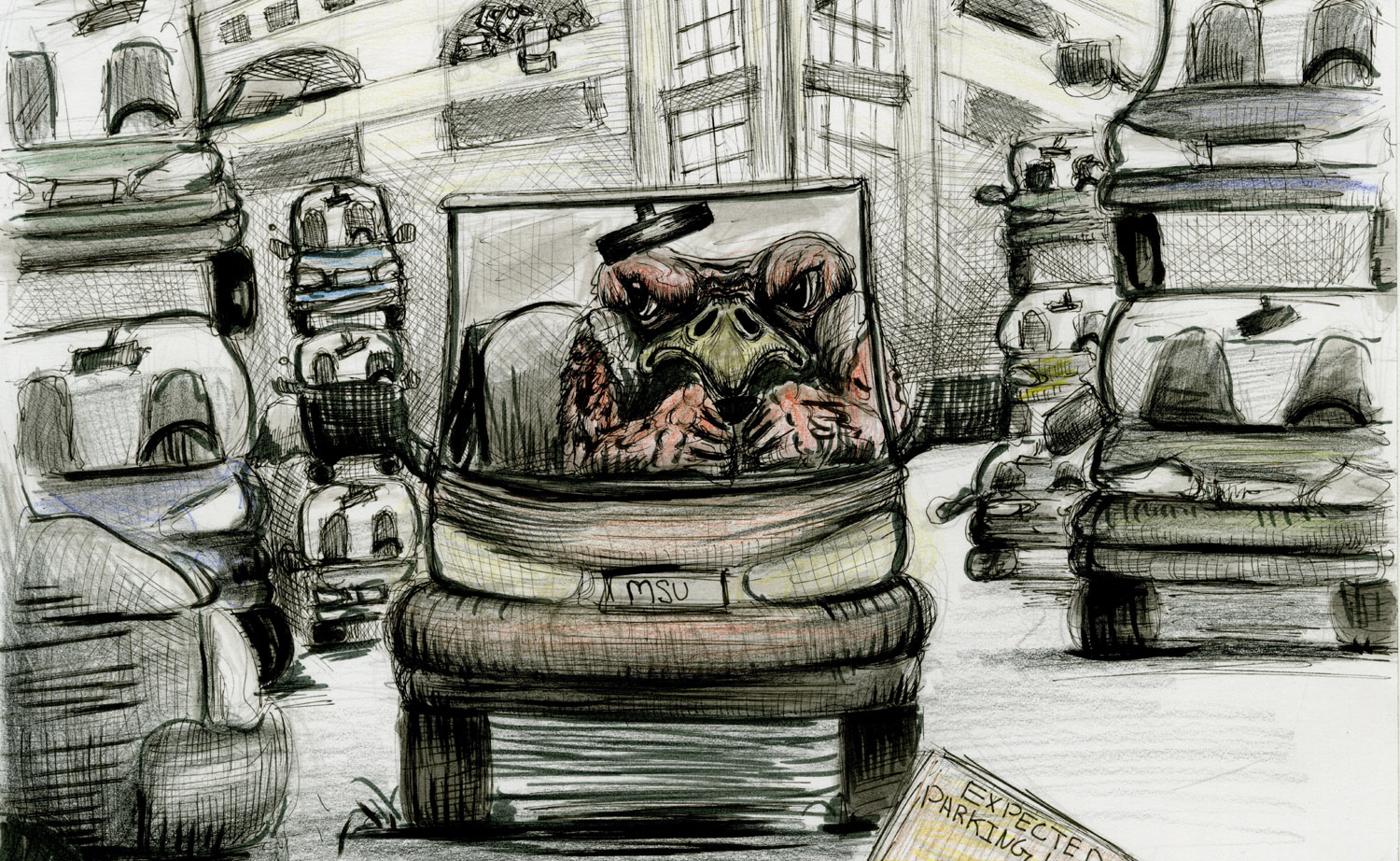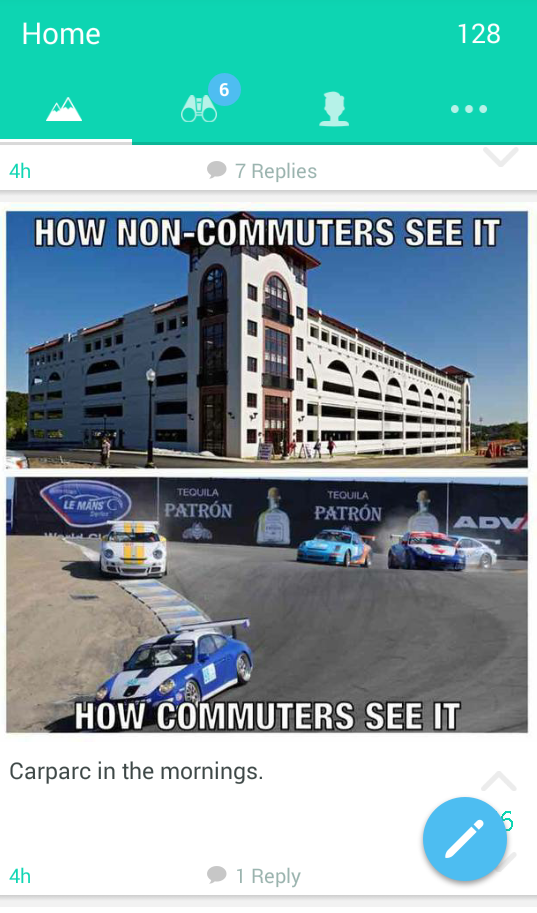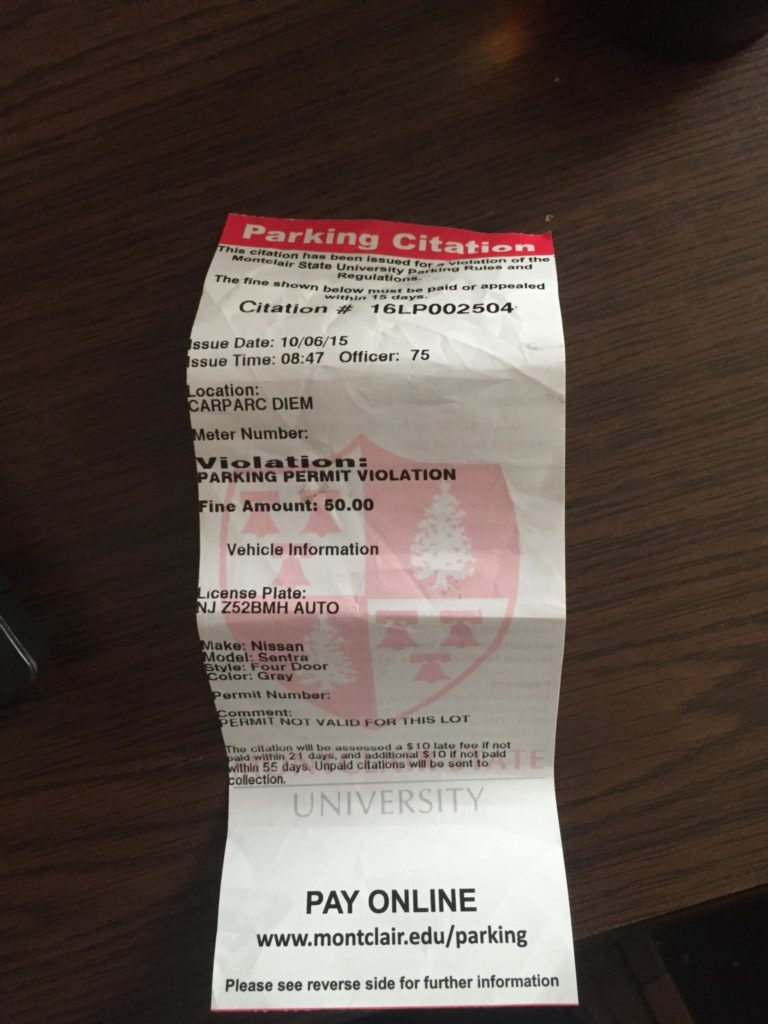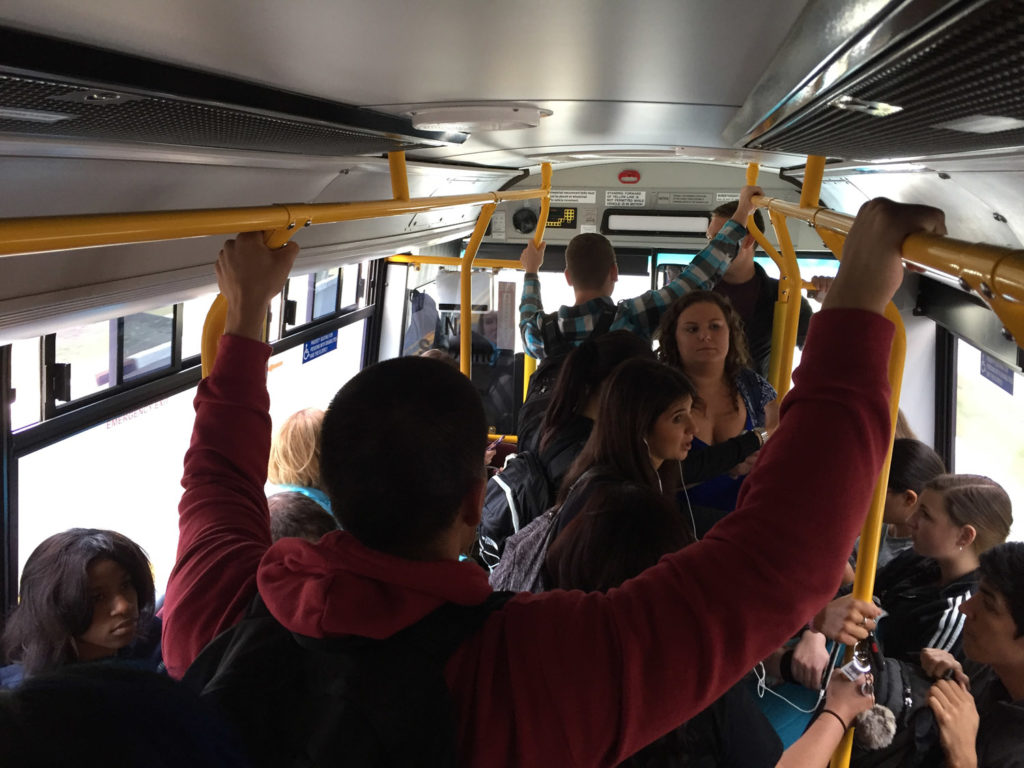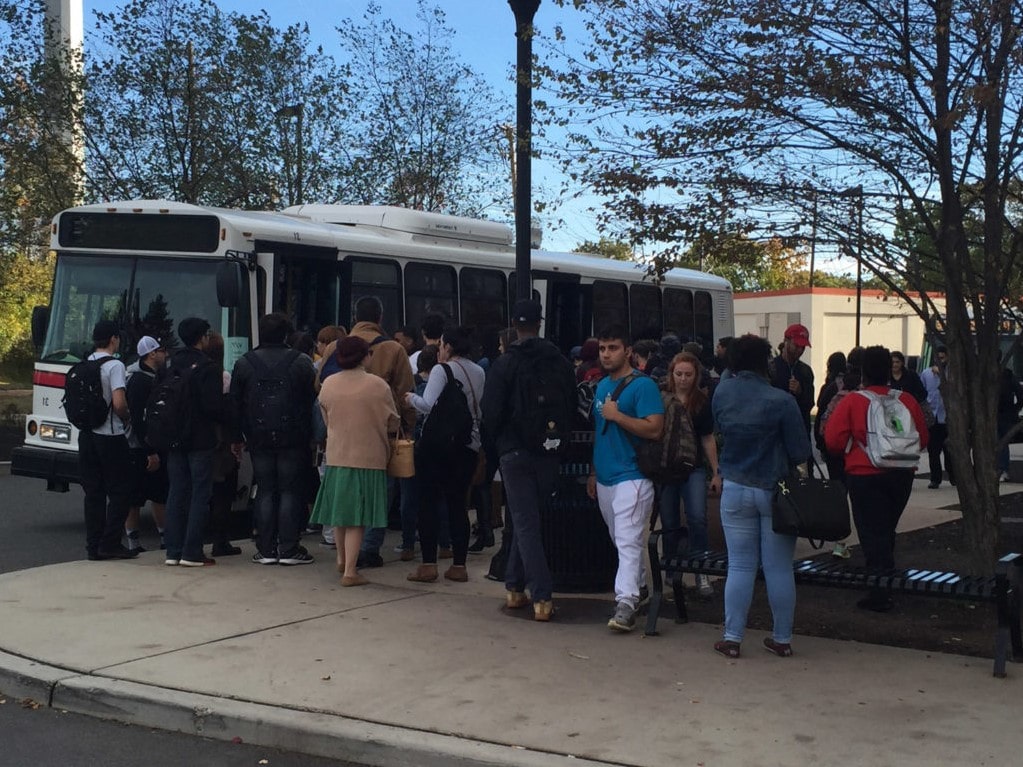Loki DeAngelis wakes up at the crack of dawn every day to drive to Montclair State University in hopes of finding a parking spot. The freshman sometimes arrives hours before class in order to secure a spot in one of the heavily crowded campus commuter lots.
While punctuality is an admirable trait, DeAngelis arrives this early just to make sure that there will be a place for him to park and actually attend his course.
“On Mondays I get on campus at 7 a.m. and my first class isn’t even until 1 p.m.,” he said.
Stories like DeAngelis’ have become increasingly common for students, faculty and staff at Montclair State, who are spending more time in their cars searching for parking.
Although parking has always been a problem for students, it seems like parking difficulties have reached an all-time high this semester, with a rising student population but little to no change in parking accommodations.
Even professors and staff are becoming more and more vocal about the state of parking: “It has occurred to me, on particularly bad parking days, to park on the sidewalk in front of College Hall as a protest,” English professor Laura Jones said. “Hopefully it won’t come to that.”
The struggle of finding a place to park on campus has become so bad in the past few months that it has become the butt of Montclair State’s jokes, allowing strangers to commiserate and unite over social media over how bad the struggle to find parking has become.
nothing better than having someone reverse up from level 5 to 6 so that he could steal my spot in RHD @montclairprobs
— lilianaaa ♡ (@fancypantslily) November 11, 2015
When you can’t park in half of the transit deck because most of the cars parked over the spot lines ???????????? #justmontclairthings @montclairprobs — Hayley Smith (@hayyylz) November 16, 2015
Student and popular Vine comedian Manny Rodriguez demonstrated just how difficult it is to find parking, even late into the afternoon.
INCREASE IN STUDENTS
For those trying to park at Montclair State, it’s a simple mathematical problem: there are way more drivers than there are spots for them.
According to Parking Services, there are 6,297 parking spaces on campus.
For the Fall 2015 semester, these 6,297 spaces, the sum of three parking garages and about three dozen surface lots, serve 20,465 students and 1,767 faculty and staff, says Steve Johnson, Director of Institutional Research for Montclair State.
While not all students commute and not all commuter students drive to school, Montclair State is widely considered a “commuter school,” as 69 percent of undergraduates and 45 percent of freshmen live off campus or commute, according to the Common Data Set for the 2014/2015 academic year.
So, parking is a pivotal issue for a significant portion of the student population and though the number of parking spaces isn’t increasing, the student population is.
In the fall 2014 semester, the total number of students enrolled broke the 20,000 threshold for the first time, said Johnson, and with a Fall 2015 freshman class of 3,115, that total only increased.
“We need to stop taking in so many incoming students,” said Alexis Daniels, a Family and Child Studies major. “We are taking in more people than we have [parking] spots for. We need to take care of the students that we already have.”
To accommodate the expanding student body and limit the number of people able to access the Red Hawk Deck parking lot, Parking Services placed a credit requirement on Red Hawk Deck parking permits for the 2014/2015 academic year, requiring students to have 60 or more credits to qualify.
But measures like these have not been enough to quell student complaints and have often inflamed them.
In response to frustrations about parking, Vice President of Campus Development and Student Life Karen Pennington said, “I’m very aware of the problem that students experience, that faculty and staff experience and that visitors experience. Parking has been an issue on the campus since it was founded in 1908. I work closely with Parking Services every year to find ways in which to make it easier, ways to make it better.”
As of right now, Pennington said that there were no definite plans changing parking in the next academic year, but she did note the administration’s recognition that a change needs to occur. “We’ve had a discussion that we need to find some different solutions for next year. Every year, parking plans change. We need to look at what next year will be.”
“I hope that students clearly understand that no one is complacent, that everybody realizes the stress that it produces,” Pennington added. “As I say, people who grew up in New Jersey came out of the womb with their car keys in their hand, so we recognize that their vehicles are very, very important to them, that driving is important and we are working very hard to make it less stressful and easier for everybody.”
THE COST OF PARKING
Annual permits at Montclair State range anywhere from $125 for an evening permit to $975 for a 2015-2016 permit.
And even with the purchase of a parking pass on Montclair State’s campus, spots cannot be guaranteed.
Montclair State University Parking Services notes in bold letters on their Regulations page, “A permit does not provide assurance of a parking space at any given time or location.”
The most commonly purchased passes are commuter passes, which have increased from $225 in Fall 2012/Spring 2013 to $250 currently, while Red Hawk Deck student permits went from $400 to $425.
For residents wishing to park in Transit Deck (one of two lots available to them) the price has remained at $300, according to Parking Services. Additionally, the number of spots has increased from last year, said Director of Parking Services Ben Omuya. There are now 876 parking spaces available, when there were only 550 for the 2014-2015 academic year.
In the 2013-2014 academic year, metered parking increased from 75 cents per half hour to $1. Then, last academic year, there was a $5 increase in the fine for exceeding the maximum time limit in a metered space.
As the costs have gone up, students have resorted to dramatic measures to find secret parking spots and avoid having to pay.
Even administrators who are entitled to reserved parking spots on campus have felt the pinch. Despite what many students think, those entitled to VIP parking have to pay for their reserved spots.
According to Omuya, there are 40 reserved spots throughout campus, 23 of which are divided amongst the school’s various departments for use for residential directors, emergencies and other needs. The other 17 spots are reserved for the school’s deans, associate vice-presidents and their higher-ups.
“Reserved permits [are] limited to faculty and staff members who have official university duties that require constant travel to meetings and other events on and off campus,” said Omuya.
The school does not simply give these spots away, though. In addition to limiting their availability, Parking Services also puts up a paywall. VIPs must pay $1,200 per year to utilize these spots, up from from $850 in Fall 2012 and $950 in Fall 2013, Parking Services said.
TICKETING
At Montclair State, students, faculty and staff are subject to two ticketing authorities: Parking Services and the University Police Department.
“Police tickets are issued for violations (moving, parking, equipment) of NJ State laws under Title 39 Code of NJ,” said Lt. Kieran Barrett, spokesman for the University Police Department, by email. “Parking Services’ tickets are for those violations of campus rules separate from law such as no permit, parking in a restricted lot or expired meters.”
In 2013, campus police issued 118 parking tickets. In 2014, they issued 96 and are likely to exceed that figure this year, having already issued 92 by Oct. 9.
These police parking tickets “include violations for parking in a handicap spot, a fire lane or improper parking (like on a roadway),” said Barrett by email.
From January 2013 to Oct. 26, 2015, Parking Services issued 50,454 citations. Of these, 10,574 citations were appealed and reduced to a warning or dismissed.
“It is important to note that most of the citations issued for the first time and appealed are reduced to a warning and treated as a learning process for both parties,” said Mariella Diaz, a professional services specialist with Parking Services, by email.
In the last four years, there has been just one fare decrease: parking in the Red Hawk Deck for less than 30 minutes is now free, while it used to cost $1.25 in the 2012-2013 academic year.
Yet, it will be hard for students, faculty and visitors to take advantage of this free parking when, as the blinking neon message declared, the “Red Hawk Deck [Is] Full.”
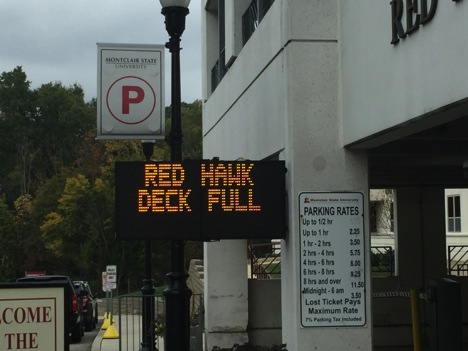
Just one of many signs, familiar to commuters, which indicate that parking lots have become full throughout the day.
Photo Credit: Shakeema Edwards
VISITORS AND PEOPLE WITH DISABILITIES
As many faculty members know, trying to find parking is a hassle in itself, but when they need to also accommodate a guest, it can become unbearable. Faculty complain they have to get to the campus much sooner than normal and hope to find a spot for the speaker as well.
“I have to physically secure a parking pass for my guest speaker,” said Professor Tom Kaminski of the School of Communication and Media.
There are however some metered spots near the Rec Center that can accommodate short term guests. This serves its purpose as a quick fix to reserve a spot for a speaker, but in the long run, the hassle of parking may be a deterring factor for speakers to come back in the future.
The problem of parking also extends to members and visitors of the university with disabilities. Kai Stendel, a prospective student visiting Montclair State University, had a very difficult time finding a parking spot on campus during his recent visit.
Stendel, who had recently broken his foot, was in a cast and in need of a handicapped space. Unable to find an available spot near main campus, Stendel was guided to the Village on Clove Road, where he was able to find a handicap parking spot.
He said he then had to walk a flight of steps and board a shuttle to take him back to main campus to begin his tour. “A handicap parking spot wouldn’t turn me away from the school, but it got me thinking about how services at the school might work,” said Stendel.
PUBLIC TRANSPORTATION
A seemingly logical alternative to parking would be NJ Transit Transportation or the DeCamp bus line.
Whether a student takes the NJ Transit Rail ,which only runs Monday-Friday, or the buses, this may seem like a positive alternative to some. But many students have to change two or three trains to get onto the Montclair-Boonton line from their homes and others are left at the mercy of the limited bus schedule to the school.
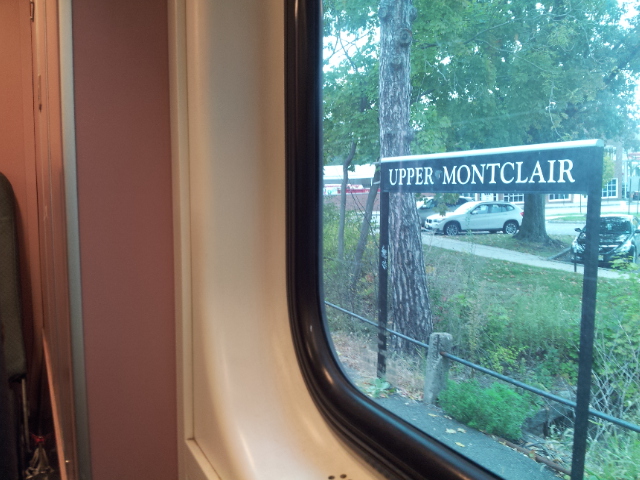
Taking the train to Montclair State can allow students to avoid the stress of parking, but it is not always easy to find a direct path to campus.
Photo Credit: Silas Kezengwa
The university has taken action to improve public transportation on campus through their shuttle services. The school offers free shuttle services weekdays with six different routes for travel around campus as well as shuttle accommodations for people with disabilities.
They also provide weekend service to Bay Street in Montclair and a Shopper’s Shuttle to Target, Shop-Rite and other stores in Clifton as well as a more limited campus-route shuttle service on weekends.
Integrated into Montclair State’s shuttle services is Nextbus, an independent application that provides real-time transit information to passengers. Users can receive information via text, mobile application or by going online to see when the next shuttle bus is coming to their location.
Even with additional services added, the wheels on these buses don’t go round and round often. Most students say that shuttles are so unreliable, they would rather walk to their destinations and if one does arrive, they’re often jam-packed.
RESIDENT PARKING
The university has also tried to rearrange the lots where commuters and residents can park, limiting the number of parking spaces by making some residential parking lots into commuter lots.
“Parking is more problematic this year,” said Brandon Jimenez, a Political Science and Public Policy major, who believes that parking has been an issue for years, but is only now gaining more attention because it is also affecting residents who had become accustomed to being allowed a car on campus and parking in several lots on campus.
With more students and more residents living on campus, parking has become tougher not only for commuters, but residents as well.
“I don’t need my car but I want it,” said Katie Kunkle, who disagrees with new limitations on the number of resident spots.
ALTERNATIVE PARKING
With the parking congestion on campus, some students have found loopholes to purchasing a permit or waiting in long lines for a spot.
Some students say they park in the parking lot in front of the ice skating rink Floyd Hall, which has spots that are open to the public.
Others park on side streets including the surrounding neighborhoods and Six Brothers Diner near Route 46. Many complain of long treks from their spots to campus.
Kelly Whiteside, a professor who lives near the university on Highland Avenue, commented on the increase of cars parked on her street.
“There are plenty of places to park, but you should only park here if you are taking one class,” Whiteside said referencing the two-hour time limit on the street. Whiteside warns that the Montclair Township Police patrol the area and will issue tickets to those staying longer than the limit.
ADMINISTRATIVE RESPONSE
The university has also introduced two smartphone apps, giving commuters the opportunity to expand their possible parking choices.
The Pay-by-Phone app allows drivers to pay for parking spaces in permitted lots. As of this semester, the majority of lots on Montclair State’s campus are now pay-by-phone permissible, allowing drivers to pay about a dollar per hour for an allotted amount of time wherever they can find an open lot spot.
Freshman Lisette Arriga lives in the Heights and during Homecoming weekend, a friend of hers came to visit. With the help of Pay-by-Phone, her friend was able to park in Lot 24, behind the Heights, for several hours without a permit and didn’t receive a ticket.
“It was a lot easier for her to park right by my building especially during the rain,” Arriga said. “It was definitely worth it.”
Another app available to commuters is called Parker. Parker notifies users of available parking spaces closest to you and your location. The app’s geolocation can determine the amount of spots vacant in a specific zone in order to inform the driver if there is availability for them in a certain area.
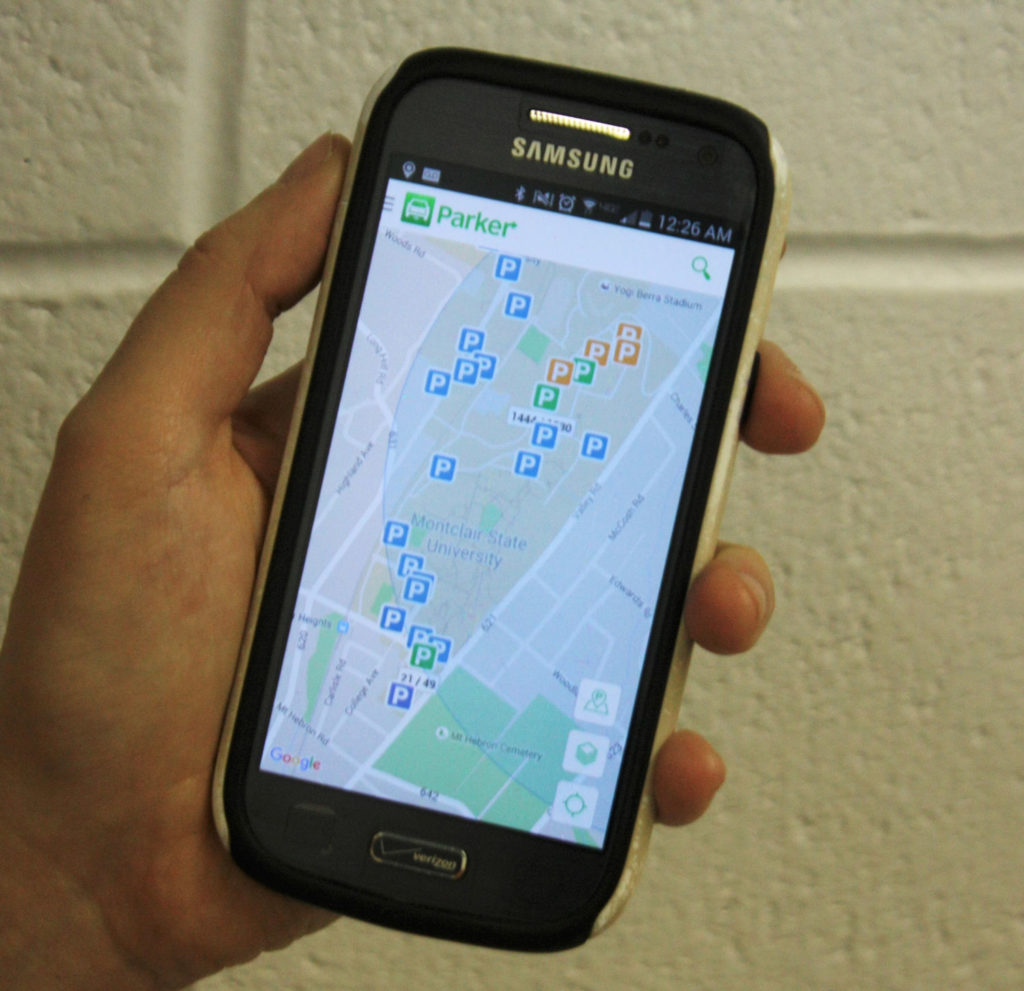
Students can use the Parker app to see how many spots are available at each lot.
Photo Credit: Daniel Falkenheim
Though this might seem like a convenient and useful app for drivers, the majority of commuters don’t know about Parker.
Senior Krista Mattessich commutes to school four days a week and spends an average of at least 30 minutes trying to find parking.
“I had no idea this app even existed,” Mattessich said. “With this app, I don’t have to spend all this time driving in and out of lots looking for a space. The app can tell me that a lot easier.”
As great as this app might sound, it does have a major downfall: it isn’t updated in real time.
With the traffic of students coming and going on campus, the app can’t keep up with the constant movement to update spot openings. Users might have to open and close the app several times in order for it to update and give a more accurate availability of spaces.
Despite difficulties with parking, Parking Services hopes to keep an open dialogue with students. On Dec. 1, the department opened a survey where students could voice their concerns directly to the department.
The email including the link to the survey also had a list of suggestions made in previous parking surveys which Parking Services has implemented. These community suggestions included the Parker and Pay-by-Phone apps, Twitter updates about parking situations, live-counting features which detail how many spots are open at specific lots and virtual permits.

